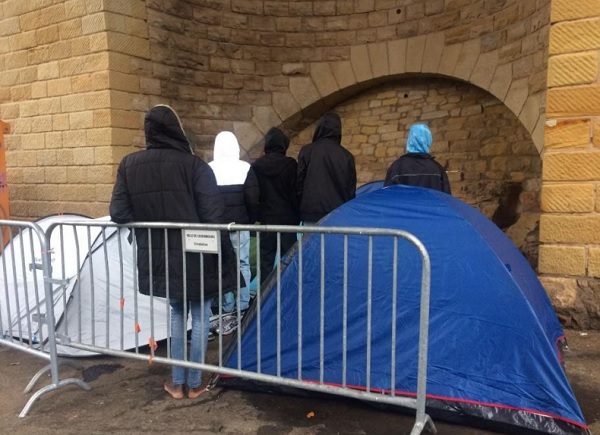 Credit: LFR
Credit: LFR
Luxembourg's refugee council, the Lëtzebuerger Flüchtlingsrot (LFR), has criticised recent changes to the Grand Duchy's asylum seeker reception policy.
The LFR, which is composed of several organisations active on the ground, noted a "drastic tightening" of reception policies for applicants for international protection. The LFR highlighted in particular that certain asylum seekers are being denied access to accommodation structures, leaving them on the streets during the cold winter period.
The council also recalled that the National Reception Office (ONA) had modified its internal regulations earlier this year to require people whose asylum application has been rejected or who hold another residence permit to leave accommodation structures within one month.
The LFR commented on a recent statement by Luxembourg's Minister of Immigration and Asylum, Jean Asselborn, announcing that from 23 October 2023, the Grand Duchy was no longer offering shelter to single men seeking international protection within these accommodation structures. The LFR argued that such a policy went against human rights commitments, noting how many people now "find themselves on the street, unable to access an accommodation structure, even after having expressed their intention to file an application for international protection."
The LFR expressed its fear that hundreds of people would find themselves in this situation in the coming weeks and stressed the need for "a real strategy" to avoid generating more precariousness in Luxembourg. To achieve this, it urged for dialogue between the State, the municipalities and civil society "to find solutions to this problem urgently". The LFR has also called on the Ministry of Immigration and Asylum to "immediately suspend its policy of refusing access to accommodation structures for applicants for international protection and to immediately put in place reception measures to guarantee that each applicant can sleep in shelter."
The LFR concluded by warning that Luxembourg should avoid aligning itself with the "harsh" reception policies of other European countries.
Minister Asselborn responds
In response, Minister Asselborn released a statement in which he offered some explanations for the recent policy change. He noted a "constant influx" in recent years, confirming that accommodation capacities have "reached their limits", despite the development of ONA's accommodation network. The latter currently counts 7,703 beds - an increase of 252.5%, i.e. 5,518 additional beds, compared to 2014.
Minister Asselborn attributed the decision to take new measures to the "exhaustion" of Luxembourg's reception capacity, "coupled with a general housing crisis". He stressed that the changes were aimed at giving "absolute priority to women, children and families as well as the most vulnerable people."
He confirmed that since 23 October 2023, male asylum seekers who are travelling alone are no longer automatically admitted to the first reception centre. Instead, they are invited individually to meet with ONA social services, who assess people's vulnerability and needs and establish a waiting list for those wishing to be accommodated by the State. Priority is given to vulnerable people over single male asylum seekers, who may later be allocated a bed "within the limits" of availability.
Minister Asselborn confirmed that since the implementation of this new procedure, 53 men have been summoned by social services. Seven men never showed up for their appointment, whilst seventeen men were allocated beds. Two men to whom a bed was allocated never showed up for initial reception, he said, adding that 27 men were waiting for a bed as of 31 October 2023.
Minister Asselborn also confirmed that the ONA was working on increasing reception capacities, for example Hall 7 of LuxExpo The Box in Luxembourg-Kirchberg is set to be operational towards the end of November, instead of 1 December 2023 as initially planned. The hall will be available until 31 January 2024 and can accommodate up to 600 temporary beds.
The immigration minister added that the Public Building Administration, the Grand Ducal Fire and Rescue Corps (CGDIS) and the ONA have set up a working group to study the feasibility of a new accommodation structure by converting existing buildings "as quickly as possible".
Other accommodation structures are being finalised, such as in Schimpach, where the planned end of work is scheduled for January 2024 with a maximum capacity of 55 beds, he noted.
Minister Asselborn concluded that "the priority remains to be able to ensure the reception and accommodation of children and families as well as the most vulnerable people."








